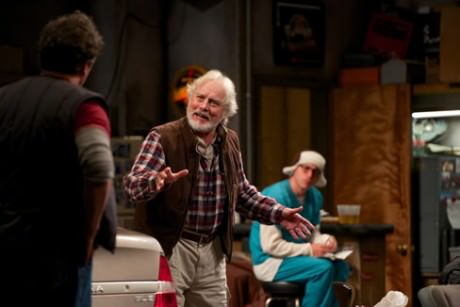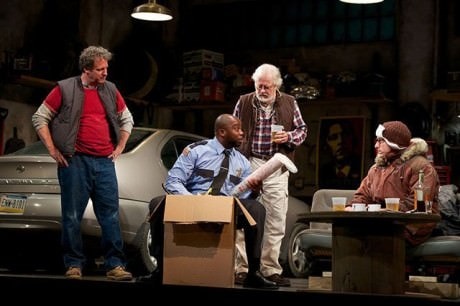North of the Boulevard is not for the faint of heart; neither is it for the prudish or the overly sensitive; nor is it for those who require anything close to political correctness. North of the Boulevard by Bruce Graham is a relentlessly apocalyptic look at the collapse of an inner city neighborhood in America. As portrayed, this neighborhood, circa 2008, is beset by rising crime, out of control violence, increasing racial hostility, seemingly complete economic collapse, total educational dysfunction, and a severe deterioration of public services and institutions.

Think Detroit moments before its bankruptcy and the complete collapse of its middle class with packs of wild dogs howling beyond the barriers.
At the center of this dark vision of the urban middle class is Trip, owner of Trip’s Auto Repair Shop. His shop’s wall is being invaded by roots from a tree whose owner he cannot locate. His city’s mayor and police force are corrupt, backstabbing villains who are only willing to protect those who have privilege and will scratch their backs. His high school son has just been attacked by a roving gang of black youths, and now his wife is in tears. His friends and neighbors are so desperate for relief from bad debts or despair that they are no longer to be trusted.
Think man who has hit bottom and who now carries a handgun with him to work.
Think dry kindling ready for the fire.
Think the darkest stereotypical image of urban America and a Tea Party ready to explode in a fury over the fact that America has sunk into a cesspool of spiritual, moral, and humanitarian meaninglessness.
Oh, and did I mention that North of the Boulevard is a comedy?
Brit Whittle plays Trip, the center of this slice-of-life lower depths, with an earthy authenticity. As a good hearted capitalist who values caring relations more than sound business decisions, he definitely represents a bygone era. He also represents a desperate small businessman not swamped by government regulations, as we so often hear whined about by Republican talking heads: rather, this entrepreneur is overwhelmed by a city’s crumbling infrastructure and his own lack of political clout, the kind of clout that solves problems with a phone call, the kind to which the bigger Pep Boys franchise is privileged.
Joining Trip in his repair shop is also another kind of bygone era representative: a flamingly funny but virulent bigot named Zee, who will probably only leave you shaking your head in disgust, even as you catch yourself snickering into your jowls. Michael Goodwin tackles this too-wacked-to-be-believed extremist with perfect comic timing and a robust sense of the unconsciously hypocritical bastard. You won’t hate him as much as just never want to share a Saturday evening at the local pub with him.
These two polar opposites establish the play’s milieu with Trip doing his best to put a lid on Zee’s obsessive racism but with next to zero effect. He tries everything except kicking the bum out, as Zee has been every other place in town: even the nearby McDonald’s has exiled him for stealing too many napkins.
Then Bear enters, played by Jamil A.C. Mangan. Bear is one of the only black men in America who did not vote for Obama: he thought Obama looked too innocent, which means he thought McCain looked experienced (at what, we’ll never find out); but Bear also thinks that some “Cracker” will assassinate Obama soon after he takes office. Bear wants more than anything to get out of town, to go down to Florida so that he can spend more time with his son.
Finally, we have Larry, the underachieving son of Zee, and another man down on his luck: the recent housing crisis (2008) has left him homeless and forced him and his wife and autistic son to move in with his father, an arrangement that Zee hates and that Larry desperately wants to change. Jason Babinsky gives Larry a wonderful sense of understatement even as he combines naïveté with deep rooted father issues (with Zee as your Dad, who wouldn’t have issues).
If you are looking for a story in North of the Boulevard think Three Sisters, only make the sisters struggling middle class men and make the promised land not Moscow but north of the boulevard where buildings aren’t crumbling, politicians aren’t corrupt, and people aren’t crappy, but happy. In addition, these men aren’t yearning for lives beyond boredom; rather, they want lives not filled with hate and fear. During Act 2 their Act 1 complaints about their lives lurch toward a possible solution to their dilemma of quick sand. The only problem lies in the ethical quandaries that arise.
Director Ed Herendeen keeps the pace of the show moving and with set designer David M. Barber transports the audience deep into the oil and grime of a mechanic’s paradise. Costumer Therese Bruck handles the attire with authenticity, and designer D. M. Wood lights this world with comedy in mind. I must say that the preshow sound track by David Remedios left me puzzled and annoyed unless an annoying fusion of static and roadway was the intended effect.

North of the Boulevard‘s combination of middle class (working class) rage and white male hatred is rarely seen on America’s stages, which as playwright Graham mentions in the program mainly caters to an “upper-middle-class-to-wealthy” audience. In this sense, its story reverberates and provokes: it also sends out alarm bells, as more and more angry men (and some women) walk the street packing firearms. If Graham’s vision of America is not hyperbolic, or isolated to a few urban catastrophes, then we’d all better pray that we do not end up in the crossfire.
Running Time: Two hours with an intermission.
North of the Boulevard and The Contemporary American Theater Festival (CATF) continue through August 3, 2004, in Shepherdstown, West Virginia. Performance tickets to CATF can be purchased through the Theater Festival Box Office, Monday to Friday from 11 am to 5 pm, by calling (800) 999-CATF (2283), or by purchasing them online.
Learn more about the plays, and/or look at the full schedule.
LINKS
Robert Michael Oliver’s review of ‘The Ashes Under Gait City’ on DCMetroTheaterArts.
Contemporary American Theater Festival Interviews: Part 1: An Interview with ‘North of the Boulevard’ Playwright Bruce Graham.
The Playwright’s Playground: ‘The Playmakers – CATF 2014:Interview With Ed Herendeen & Peggy McKowen Who Preview The Season by Sydney-Chanele Dawkins.
The Playwright’s Playground: The Playmakers CATF 2014: Ed Herendeen & Peggy McKowen Discuss the Development of CATF Plays by Sydney-Chanele Dawkins.




